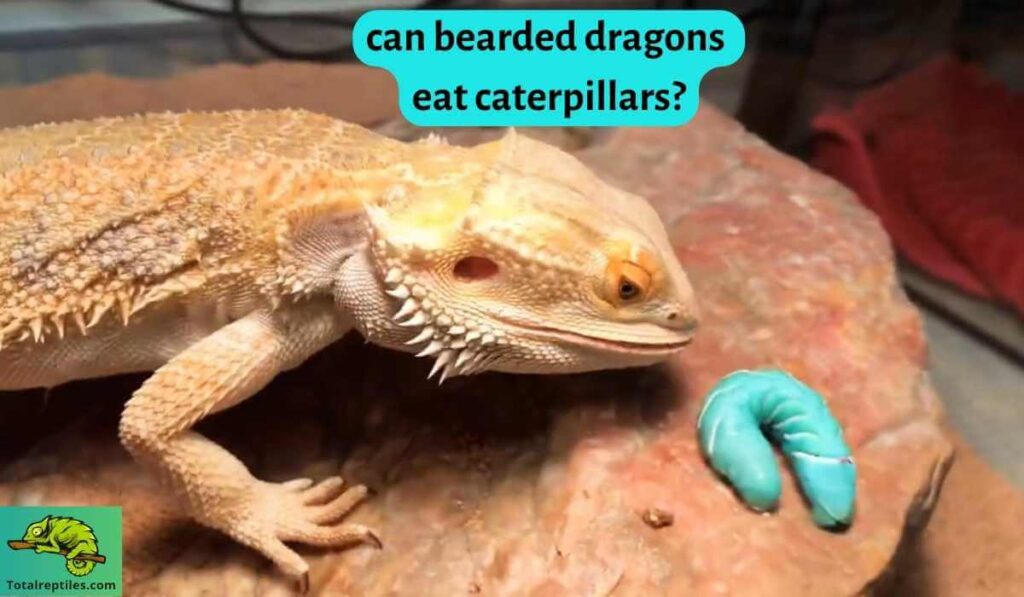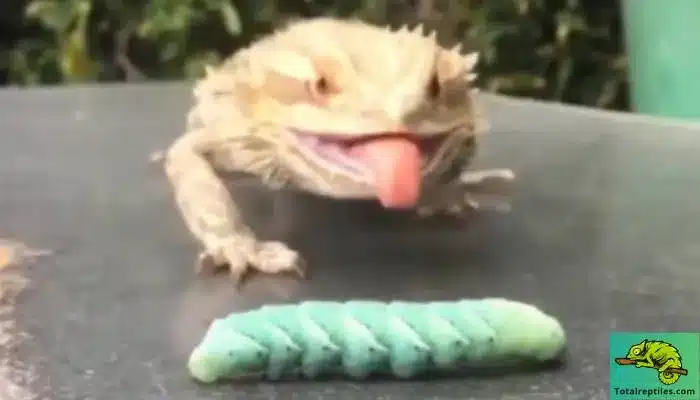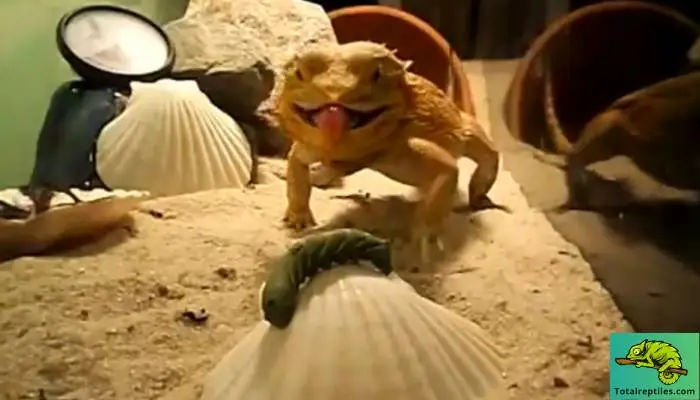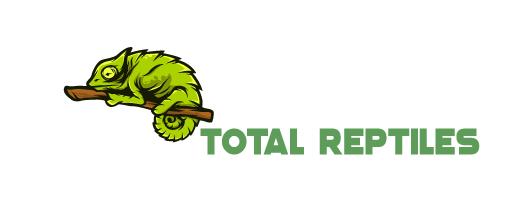To what extent can bearded dragons eat caterpillars? Or are these wiggly worm-like insects really edible for your reptile friend?
According to the bearded dragon diet guide, caterpillars are safe to give as long as you are aware of their quantity, size, and species. This is because some caterpillars may pose health risks while others may be too large for the beardies to digest.
While this is the brief answer to the inquiry, more details need to be unearthed. Continue reading the guide to discover which caterpillars are feed friendly and why!

Can Bearded Dragons Eat Caterpillars?
Yes, you can feed your dragons certain caterpillars that will not harm them. But the question is, should you give caterpillars to your pet?
Know that an inland bearded dragon, of various life stages, requires from 20% to 50% of animal matter. This is to fulfill the protein and other mineral necessities for healthy growth.
Take the silkworm caterpillar, for instance. It contains high levels of protein, moisture, and other elements to consider the most nutritious insect diet for your dragon.
And the best part is that it is suitable for all stages – baby, juvenile, or adult!
However, exercise caution when feeding caterpillars to the reptiles. The size should not be larger than the dragon’s head width. You do not want the creature to choke on its treat or experience impaction.
Remember, some caterpillars may contain toxins. So it is wise to research or consult your vet before trying something new.
Can Bearded Dragons Eat Monarch Caterpillars?
Even if you wish to give your dragons a nibbling snack, never allow them to consume a monarch caterpillar.
In the caterpillar stage, the monarch eats milkweed plants – a food source comprising poisonous toxins that can be passed to its predator.
These poisonings can make the bearded dragon sick or even kill it, as it does not have enzymes to break down the toxic substances.
If your pet eats a monarch caterpillar by accident, monitor its vitals as closely as possible for the next few days and visit a vet as soon as possible
Can Bearded Dragons Eat Hairy Caterpillars?
As strange and hostile as these caterpillars may look, they are actually feed-friendly for your bearded dragons.
However, the hairy feature may sometime indicate potential toxin presence in certain species. Thus, you should learn about the kind and get these grubs from a reliable pet store than catching them in the wild.

Although the fuzzy ones you capture can be harmless, the chance of noxious materials covering the body can still be deadly for the pet.
Can Bearded Dragons Eat Green Caterpillars?
Some dragon owners believe green caterpillars to be harmful, whereas others remark on how safe it is to feed their pets.
Technically, green caterpillars are okay for beardies so long there is no other color present on the invertebrate’s body. Colors are highly toxic for reptiles.
Hence, it should be completely green or opt for a different kind that is free from harmful poison.
Types of Caterpillars that Are Safe for Bearded Dragons to Eat
Not all caterpillars are food friendly for your beardie. It may take a while to study all, so we have prepared this list of safe caterpillar feeds you can obtain without worrying.
Hornworms
These are considered one of the healthiest complements for a bearded dragon, especially when coming out of brumation. Hornworms have high water and calcium content alongside low-fat levels.
Wax Worms
Although wax worms are safe to give, they offer higher fat content than most caterpillars, making them a rare treat instead of a staple food. They also lack calcium despite the decent protein presence.
Silkworms
These are the best treats to include in a regular diet plan. Silkworms are high in protein and water content as opposed to fat amount.
Butter Worms
The butter worm caterpillars are on the safer side of eating. However, they have less moisture than most and lesser protein content. On the other hand, they are good sources of calcium to strengthen bones.
The Nutritional Value of Caterpillars
It is important to know the nutritional profile of a caterpillar to understand what you are giving your reptile and at what amount.
Nevertheless, it isn’t easy to ascertain an accurate percentage analysis of the nutritional qualities of caterpillars due to their variable class. Despite the varied compositions, caterpillars are high in crude protein, moisture, and fat.
They also contain small amounts of vitamins A, B2, and C, calcium, magnesium, and other minerals. The table below should give you a rough idea.
| Caterpillars | Protein | Fat | Moisture | Calcium (mg/100g) |
| Hornworms | 9% | 3% | 85% | 46 |
| Wax Worms | 16% | 20% | 61% | 13 |
| Silkworms | 64% | 10% | 76% | 34 |
| Butter Worms | 16% | 5% | 58% | 42 |
Potential Risks of Feeding Caterpillars to Bearded Dragons
Here is what you need to know:
- Overfeeding can occur when the owner feeds more live foods than required based on the beardie’s age. It is the leading cause of nutritional imbalances and obesity.
- While caterpillars are okay to feed, it is not usually recommended by professional vets for the risks of potential toxins ingestion.
- Caterpillars that are larger than the space between the eyes of a dragon can lead to impaction or choking, making them deadly.
- Wild caterpillars are extremely ill-advised as they may contain pesticides, parasites, bacteria, etc.
How Often to Feed Caterpillars to Bearded Dragons?
The feeding schedule depends on the type of caterpillar you provide for the beardie. See the table below as a reference.

| Caterpillar Type/BD Life Stage | Baby Bearded Dragon | Juvenile Bearded Dragon | Adult Bearded Dragon |
| Hornworms | Not recommended | 20-50/day in rotation with other insects | 3-5/week in a 3-day rotation |
| Wax Worms | 3-5/day in moderation with other insects | 3-5/day in moderation with other insects | 3-5/week in moderation with other insects |
| Silkworms | 10 minutes twice a week in rotation with other insects | 10 minutes twice a week in rotation with other insects | 10 minutes twice a week in rotation with other insects |
| Butter Worms | >5/day | Up to 5/day | Up to 15/day |
Conclusion
So, can bearded dragons eat caterpillars without risking their lives in the process? It is a complex evaluation that relies on the dragon’s age, insect classification, and the nutritional profile each caterpillar delivers.
Always consult with a certified vet before adding a new insect to the diet palate of your reptile. Plus, observe your beardie for a couple of days for any symptoms of impaction or lethargy.
Caterpillars are most appetizing when provided live. Frozen options are also an odd preference for some dragons. We would be delighted to learn which your pet likes.
References
- Barboza, T. (et al.), ‘Survey of Feeding Practices and Supplement Use in Pet Inland Bearded Dragons (Pogona vitticeps) of the United States and Canada’, Journal of Herpetological Medicine and Surgery (2022)
- Boyer, Thomas. H., ‘Diseases of Bearded Dragons’, Proceedings of the Pacific Veterinary Conference (2015)
- Care, Bearded Dragon. ‘ragon’ (2013)
- Baan, R., ‘The nutritional value of fourteen species of edible insects in southwestern Nigeria’, (2006)

